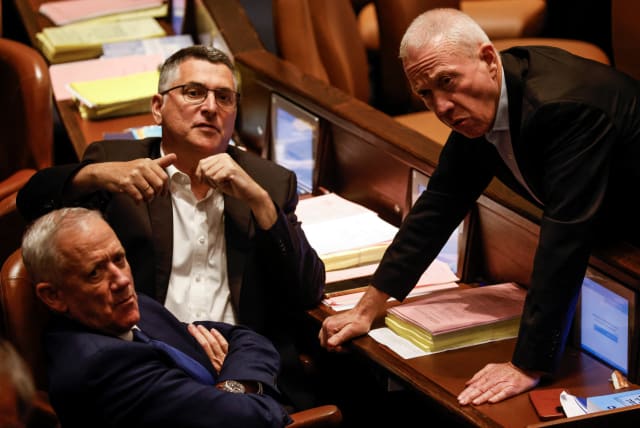Gantz, Sa'ar clash with rest of coalition over legislative veto power

Conflict arose within the government after the coalition announced that it would proceed with a bill proposal that Gantz and Sa'ar vetoed.
A dispute broke out within the government on Monday between the pre-October 7 coalition and Ministers-without-Portfolio Benny Gantz and Gideon Sa’ar after the coalition announced that it would move forward with a bill proposal that Gantz and Sa’ar vetoed.
The two ministers announced on Monday morning that they were using their veto power on a bill that would change the makeup of committees that elect rabbis at the municipal and neighborhood level, giving Israel’s chief rabbinate more power over the appointments as opposed to the municipalities or neighborhoods themselves.
In the coalition agreement to form the emergency government, signed by Gantz and Prime Minister Benjamin Netanyahu, the sides agreed that “no bills will be legislated and no other decisions will be made, excluding decisions to lengthen the current situation and stabilize the economic situation, unless agreed upon by the heads of parties that signed this document.”
Disagreements over who can use vetos
However, the (pre-October 7) coalition said it would not respect the veto power. Coalition members first argued that Sa’ar did not have veto power because his decision to break away from Gantz’s National Unity party meant that Sa’ar must sign his own party’s coalition agreement. Later, the coalition also argued that Gantz was the first to have violated the coalition agreement by flying to Washington without Netanyahu’s permission earlier this month and by opposing the renewed 2024 national budget, which passed into law on March 13.
The bill in question was first promoted ahead of scheduled elections for state rabbinical positions in the summer of 2023. However, those elections were postponed – the election to choose Israel’s new Ashkenazi and Sephardi Chief Rabbis to April 9 and an election for each rabbi’s 15-member rabbinical council to June 10. The upcoming elections, therefore, required that the law be promoted once again.
The bill proposal would weaken the power of local authorities to appoint local rabbis, give the religious affairs minister significant power over the selection of municipal and neighborhood rabbis, and subjugate the entire array of local rabbis and religious councils to the chief rabbinate.
The religious characters of the various cities
In a discussion in June, Tani Frank, director of the Center for Judaism and State Policy at the Shalom Hartman Institute, told The Jerusalem Post that since each city in Israel has its own unique religious character, ranging from the ultra-Orthodox Bnei-Brak to the largely secular Tel-Aviv, the existing law gives local authorities a majority in the committee that is responsible for electing its chief rabbi.
While local chief rabbis, meaning chief rabbis of cities, towns, regional councils, etc., are officially subordinate to the chief rabbinate, the reality on the ground is that each local chief rabbi has broad independence to adapt religious services to the character and needs of each authority.
Frank explained that the new law would alter this situation both by stating in law that the Chief Rabbinate Council will be the “highest religious and halachic authority” and by altering the makeup of the committees that elect the local rabbis. If that happens, he said, the religious affairs minister and the chief rabbinate, and not the local authority leaders themselves, would have a majority and could, therefore, for example, appoint an ultra-Orthodox rabbi as the chief rabbi of Tel Aviv.
In addition, critics of the law have claimed that it is based on an attempt by Shas, which sponsored the bill, to appoint rabbis affiliated with the party to the rabbinical positions.
At least two Likud Knesset members said on Monday evening that they opposed moving the bill forward, despite Sa’ar and Gantz’s veto. They included MKs Tally Gotliv and Eli Dallal; the latter stated that “no elected officials should deal with what can create divisiveness, argument, and discord. No law is worth it at this stage.”
Jerusalem Post Store
`; document.getElementById("linkPremium").innerHTML = cont; var divWithLink = document.getElementById("premium-link"); if (divWithLink !== null && divWithLink !== 'undefined') { divWithLink.style.border = "solid 1px #cb0f3e"; divWithLink.style.textAlign = "center"; divWithLink.style.marginBottom = "15px"; divWithLink.style.marginTop = "15px"; divWithLink.style.width = "100%"; divWithLink.style.backgroundColor = "#122952"; divWithLink.style.color = "#ffffff"; divWithLink.style.lineHeight = "1.5"; } } (function (v, i) { });

